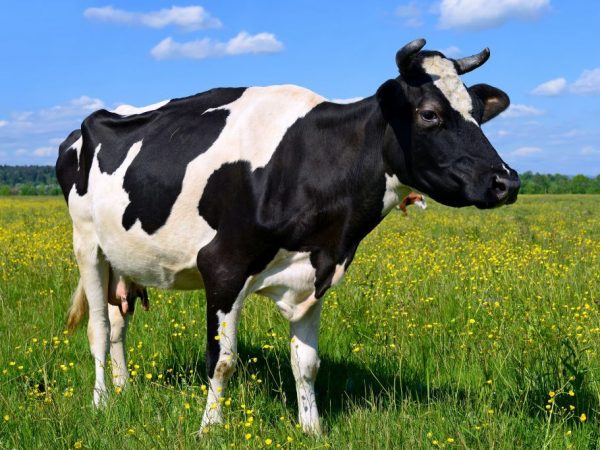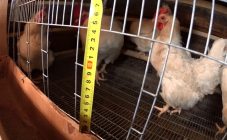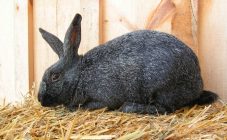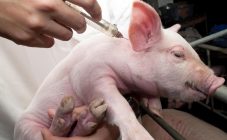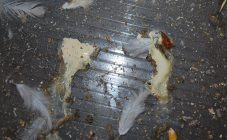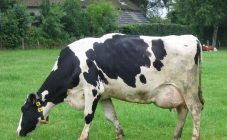Content:
Cow diarrhea is often a symptom of gastrointestinal tract pathology. However, in some cases, diarrhea appears due to viruses. If cattle has diarrhea, the veterinarian will help determine the causes and treatment.
Causes of loose stools in a cow
Diarrhea is an increase in the frequency and quantity of bowel movements. Fecal liquefaction is a sign of intestinal dysfunction. Often a failure occurs due to the development of inflammatory processes. Common symptoms are increased frequency of bowel movements up to 5-12 times a day, changes in the color and consistency of feces, the appearance of mucous membranes and blood inclusions, weakness, depression, loss of appetite.
Causes leading to diarrhea:
- poor quality feed;
- a sharp change in diet;
- drinking cold water;
- the use of nutrient-poor foods;
- poisoning with poisonous herbs and fertilizers;
- lack of proteins, vitamins, minerals;
- dysbiosis;
- allergy to food and drugs;
- calving.
Experienced breeders note that often diarrhea in a cow is observed in the fall due to the animals eating frozen wet grass, which provokes fermentation in the intestines.
The death of an animal often causes dehydration. Symptoms are drying out of the mucous membranes, drooping eyes, lack of urination, slowing of the heart rate.
Diarrhea can be a symptom of the development of viral or infectious diseases. Diarrhea is caused by:
- bacteria;
- worms;
- viruses;
- protozoa.
Calves may develop diarrhea due to E. coli. The bacterium can be transmitted from an adult cattle or a human. Symptoms are severe diarrhea, dehydration, exhaustion, sepsis.
Rotavirus also causes diarrhea and often infects cattle in late winter or early spring. Every third case of the disease ends in the death of the animal. Symptoms are severe diarrhea, apathy, weakness, loss of appetite, refusal to drink, hyperthermia, loose, slimy stools, dehydration.
Coronavirus infection affects newborn calves, manifests itself at 7-11 days of life. Symptoms are diarrhea, mucus, blood in the feces, exhaustion, damage to the mucous membranes and respiratory tract.
The simplest organisms are the causative agent of infectious diseases that can affect not only domestic animals, but also humans. Symptoms are diarrhea, watery feces, pain, vomiting, exhaustion, loss of appetite, fever.
To determine the cause of diarrhea and make a diagnosis, the veterinarian takes into account the following indicators:
- Body temperature;
- feces color and consistency;
- frequency of bowel movements;
- heart rate;
- the presence of vomiting.
It is also necessary to provide information about when the diarrhea began, what the animal ate the day before and the timing of the last deworming.
Diarrhea treatment
The cow is diarrhea, how to treat? Methods:
- The animal's diet should be revised and a diet introduced. A sick cow should not be fed for 1-2 days, the amount of water is not reduced. After this period, the cow is gradually returned to its usual diet. The animal is given small portions of high-quality hay, a mash of juicy feed and root crops, then concentrates are added to the food. Milk is prohibited.
- Thoroughly examine the livestock feed for the presence of deteriorated components, poisonous herbs and substances.
- Remove toxins from the body of a sick individual. For this, the animal is given castor oil and absorbent preparations, watered abundantly with water, injections of apomorphine are given, and Glauber's salt is added to the feed.
- Astringents can help stop diarrhea. Medicinal decoctions from oak bark, cherry fruits, extracts of St. John's wort and burnet are effective.
- The introduction of electrolytes can protect against dehydration: injections of 5% glucose solution, saline, calcium borgluconate, Ringer's solution. With signs of exhaustion and lethargy, fluids are infused several times a day. The total volume of infusions is 1 liter. You can also drink glycine.
- You can support the activity of the rest of the body's systems with the help of injections of caffeine and sulfocamphocaine, doses are calculated according to the instructions.
- Antibiotics and sulfa drugs will help to destroy bacteria and prevent the development of complications.
- If blood is observed in the stool of an animal, he is prescribed injections of novocaine and an antibiotic.
- To relieve pain, the cow is given No-shpa, analgin and Diprofen.
Traditional methods of treating cattle diarrhea
It is not always possible to show sick cattle to the veterinarian. How to treat diarrhea in a cow at home? Methods:
- A sick animal is soldered with a decoction of rice, flax, oats. Dilution of decoctions with milk or nutritional mixture is allowed.
- Eliminates toxins overcooked brown bread. Croutons are ground into crumbs and then added to boiled water.
- Activated carbon fights well against hazardous compounds.
- A decoction of plantain leaves and rose hips will have an anti-toxic effect.
Prevention of diarrhea in cows
To prevent diarrhea, you need:
- Make the right diet - food should be balanced and contain useful vitamins and minerals.
- Monitor the quality of feed - rotten and spoiled products should not get into food.
- Remove poisonous plants from pastures.
- Install a stationary drinker and keep it clean.
- Do not graze cattle during frosts.
- Regularly use disinfectants to clean barns.
- Maintain a clean cow pen.
- Isolate sick animal immediately.
- Vaccinate and deworm the herd regularly.
Bovine diarrhea is a fairly common occurrence that can be caused by poor diet, mismanagement, poisoning, allergies, or viral and bacterial diseases. Cattle viral diarrhea is treated under the supervision of a veterinarian, he will determine what is causing the upset gastrointestinal tract, and prescribe therapy to normalize it. You can relieve the condition of the cow before the arrival of the doctor with folk remedies. Timely isolation of a sick individual will help prevent infection of the entire livestock. Preventive measures can help protect against recurrence of diarrhea.
